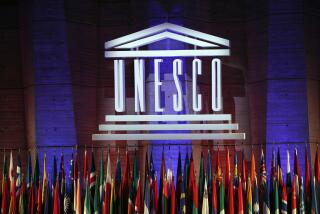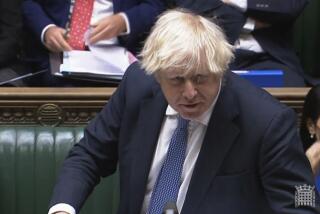Britain Joining U.S. in Pulling Out of UNESCO
- Share via
LONDON — Britain announced Thursday that it will withdraw from the U.N. Educational, Scientific and Cultural Organization and charged that the agency it helped found 40 years ago has become a platform for leftist propaganda.
The move, which takes effect Dec. 31, makes Britain the first country to leave UNESCO since the United States pulled out last year, citing reasons similar to Britain’s. Together, the two countries have supplied 30% of the UNESCO budget, which is about $398.4 million this year.
Singapore has announced that it will withdraw from UNESCO by the end of 1985. With Britain’s departure, that would leave UNESCO with 158 member nations.
Prime Minister Margaret Thatcher’s political opponents strongly criticized the move, though her minister of state for overseas development, Timothy Raison, said in making the announcement to Parliament that it will in no way diminish Britain’s support for the United Nations and its ideals.
“We are determined that our support for the United Nations should be seen as support for effective and efficient organizations,” Raison said. “Unfortunately, UNESCO is not such a body. It is sad that an organization which began with such high hopes, and to which this country has contributed so much in the past, should have gone so wrong.”
Last year, when Britain first signaled its intention to withdraw, it complained that UNESCO’s work had become highly politicized and anti-Western, that it had lost its direction as a scientific, education and cultural body and that the performance of its controversial Senegalese director general, Amadou Mahtar M’Bow, was no longer acceptable.
“There has been some improvement, but not enough,” Raison said Thursday.
In a statement issued at its Paris headquarters, UNESCO said it “deeply regrets” Britain’s move, which it said “must come as a surprise to all those who have been engaged over the past two years in a far-reaching effort to agree on UNESCO’s programs, budget, structures and functioning.”
Last month in Parliament, Raison complained about UNESCO’s plans for a “new world information order,” saying it threatens freedom of the press and could be used by governments to justify censorship.
He accused UNESCO of functioning as a medium for leftist propaganda on key issues, including disarmament and human rights, and he cited as an example a UNESCO document prepared for a world youth conference in Barcelona, Spain, earlier this year. He said it contained communist rhetoric.
Britain has also complained that roughly 70% of UNESCO’s budget is spent within its top-heavy headquarters.
Although widely expected, Thursday’s announcement touched off a storm of protest from opposition members in the House of Commons. They said Thatcher’s government is turning its back on developing nations. “A kick in the teeth for the Third World,” a Labor member, George Foulkes, called the move.
More to Read
Sign up for Essential California
The most important California stories and recommendations in your inbox every morning.
You may occasionally receive promotional content from the Los Angeles Times.













